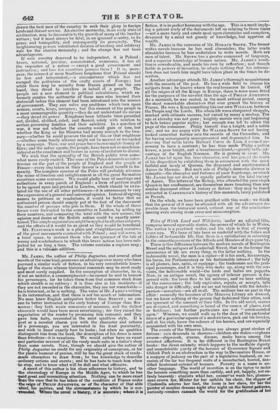Mr. JAMES, the author of Philip Augustus, and several other
novels of the same kind, possesses an advantage over many who have pursued a similar walk of fiction, in his, very considerable know- ledge of the stores whence historical romances may be most easily and most surely supplied. In the conception of character, he is, if not an imitator, a commonplaceist—he cannot be said to borrow his personages, for he takes them from that common stock from which stealth is no robbery : it is thus also in his incidents—if they are not recorded in the chronicles, they are not remarkable— he is historical, or he is nothing. The value of Mr. JAMES'S writing is its information, and that there is not too much of information. No man knew English antiquities better than STRUTT ; no one can be better instructed in the early history of Europe than Sig- MONDI : they both wrote romances of manners, and the dullest chronicle would have been more entertaining; for they raised the expectation of the reader by promising him romance, and they
i
gave him facts, recounted n the most spiritless style. If a poet or a novelist charm you with the character and actions of a personage, you are interested in his least peculiarity, and wish to know exactly how he looks ; but when no qualities distinguish him from the herd, the description of his dress is more than frivolous—it is vexatious. We would rather have an exact - and particular account of all the ready-made suits in a tailor's shop than some novels. Now, though we should give the author of Philip Augustus no credit for any originality of conception, or for the plastic humour of genius, still he has the great stock of ready- made characters to draw from ; he has knowledge to describe
• ordinary actions and events ; and he has taste to teach him when -to stop, and to know what will be dull and what offensive.
A merit of this author is his close adherence to history, and to - the Chronology of Europe in the Middle Ages, to which he has --paid. great and unremitting attention. Nothing can be more exact - thnn.the view that he has taken of the condition of France under - The-reign of PHILIP Atrotrms, or of the character of that able -chief, his politics, and the circumstances by which he is sur- liteanded. ' Where-the nOvel ististury, it is" accurate; where it is fiction, it is in perfect harmony with the age. This is a merit imply- ing a patient study of the documents left us relating to those times —not a mere hasty and mule meal upon chronicles and compilers, devoured by a mind not greedy of knowledge, but appetent of
Wealth.
Mr. JAMES is the converse of Mr. HORACE SMITH. The former writes novels because he has read chronicles; the latter reade
chronicles because he has undertaken to write novels. Both are
men of talent. Mr. SMITH has a greater command of language, and a superior knowledge of human nature. Mr. JAMES'S erudi-
tion is considerable, and made his own by reflection ; and though feeble in powers of invention, he adopts nothing that his informa- tion does not teach him might have taken place in the times he de- scribes.
Another advantage attends Mr. JAMES'S thorough acquaintance with the records of the past. He has a wide field to choose his subjects from ; he knows where the real treasures lie buried. Of all the reigns of all the Kings in Europe, there is none more fitted for the purposes of the novelist than the acre of PHILIP AUGUSTUS As a monarch, he was seated, in the most critical period, among the most remarkable characters that ever graced the history of France. He was a King something like our own WILLIAM, between the People and the Lords. His whole life wasa chequered struggle, marked with ultimate success, but varied by many a mishap. The age of chivalry was not gone ; knightly morals were just beginning to fade before popular rights ; but enough was left to adorn the page of the romancer. Philip himself was a knight, and a noble one • and we are angry with Sir WALTER SCOTT for not having looked somewhat further into the records of the Crusaders, and for having consequently misrepresented and depreciated him. In drawing that noble brute Richard Coeur de Lion, it seemed ne- cessary to have a contrast ; he has thus made Philip a politic knave, a poor knight, and a treacherous friend,—greatly to the ad- vantage of the English Norman. He is grossly in error. Mr. JAMES has hit upon the true character, and has graced the traits of his disposition by exhibiting them in connexion with the most faithful and lovely of Queens, the disgraced and anathematized. Agnes de Meranie. But each side of Philip's domestic distress is romantic—the character and fortunes of poor Ingeburme, on which Mr. JAMES has not dwelt, is equally pathetic as the fatal history of Agnes. The letters of the Bishop, who attended the poor virgin Queen in her confinement, are themselves more touching than any similar document either in history or fiction : they may be found extracted in CAPEFIGUE'S history of this monarch, lately published in French.
On the whole, we have been gratified with this work : we think that the perusal of it may be attended with all the advantages de- rivable from the historical novel, without any of the counterba- lancing evils arising from error and misconception.


























 Previous page
Previous page